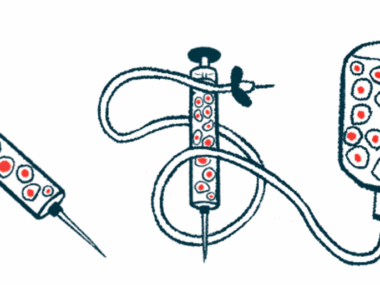Phase 3 trial of prasinezumab in early-stage Parkinson’s planned
Data from Phase 2 trials show potential efficacy, Roche says
Written by |

Roche said it will launch a Phase 3 trial testing prasinezumab, an anti-alpha-synuclein antibody, as a potential treatment for early-stage Parkinson’s disease.
The decision follows data from two Phase 2 trials showing prasinezumab had potential clinical efficacy at slowing motor symptom progression and reducing motor complications as an add-on to standard treatments. Roche didn’t provide details about its plans for a Phase 3 trial.
“We are encouraged by the efficacy signals observed across the two phase II trials and their open-label extensions, combined with the favourable safety and tolerability profile of prasinezumab,” Levi Garraway, MD, PhD, chief medical officer and head of global product development at Roche, said in a company press release.
The data “suggest that prasinezumab may have the potential to become the first disease-modifying treatment for people with Parkinson’s disease,” Garraway said.
Parkinson’s disease is caused by the loss of dopaminergic neurons, the nerve cells that produce dopamine, a signaling molecule involved in motor control. The formation of abnormal clumps of the alpha-synuclein protein in these neurons is thought to contribute to neurodegeneration and disease progression.
Slowing disease progression by targeting toxic clumps
Prasinezumab binds to the toxic clumps of alpha-synuclein, preventing them from spreading throughout the brain. The treatment is expected to ease Parkinson’s symptoms and slow disease progression.
In Phase 2 trials, the treatment is being tested as a monthly intravenous (into-the-vein) infusion, at doses based on a patient’s weight.
Results from the Phase 2 PASADENA trial (NCT03100149), which tested prasinezumab in adults with early-stage Parkinson’s disease, including those treated with MAO-B inhibitors, showed that the treatment failed to slow disease progression compared with a placebo.
However, three-year data from the study’s open-label extension indicated a possible benefit from long-term use, suggesting prasinezumab seemed to slow the progression of motor symptoms and the risk of motor complications, compared with patients who started the treatment with a one-year delay.
Similar results were seen in the Phase 2b PADOVA trial (NCT04777331), which tested prasinezumab against a placebo in adults with early-stage Parkinson’s who were on a stable dose of MAO-B inhibitors or levodopa. Patients who received prasinezumab, particularly those who were also on levodopa, had a trend toward lower risk of motor symptom progression.
In the trial’s open-label extension, participants receiving prasinezumab also showed a trend toward slower motor progression after two years, with reductions of 30%–40% compared with those who had received a placebo.
The treatment has been generally safe and well tolerated in more than 900 participants who received prasinezumab across clinical trials, Roche said. More than 750 of them continue on the therapy in the trials’ open-label extensions, with some patients having been treated for as long as five years.
Prasinezumab is being developed by Prothena in collaboration with Roche. The two companies entered a license agreement for the development and commercialization of antibodies targeting alpha-synuclein, including prasinezumab, for Parkinson’s disease.



